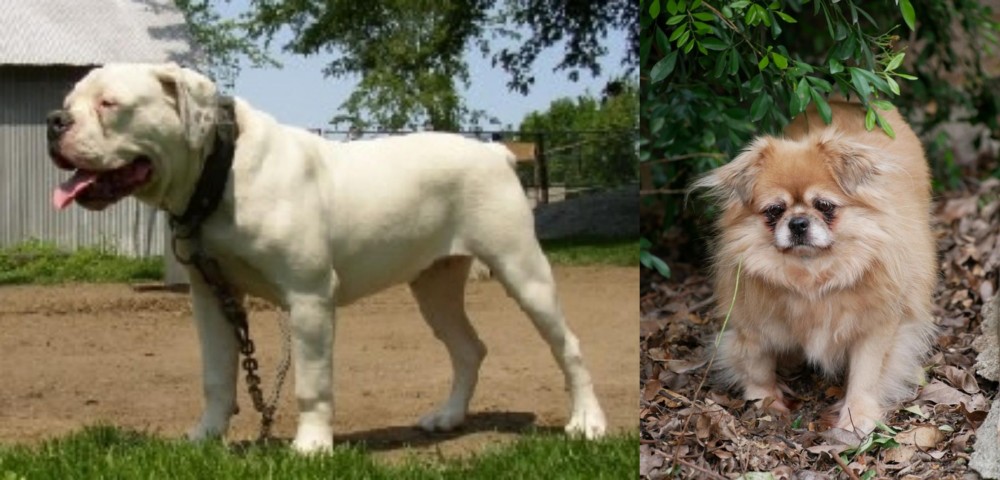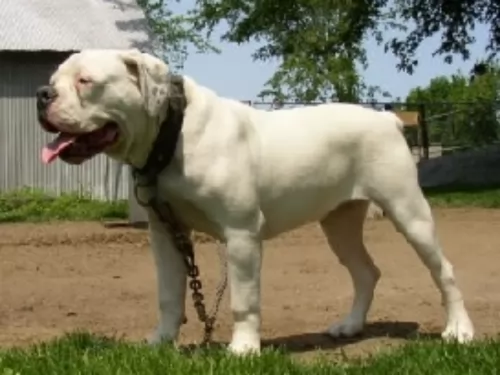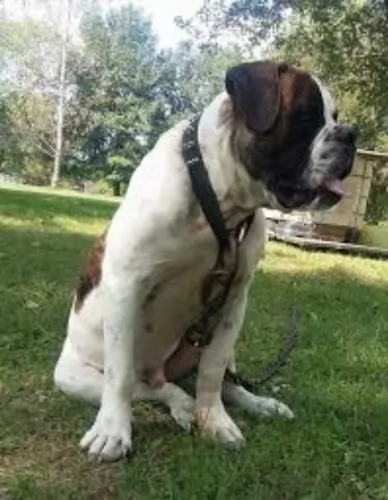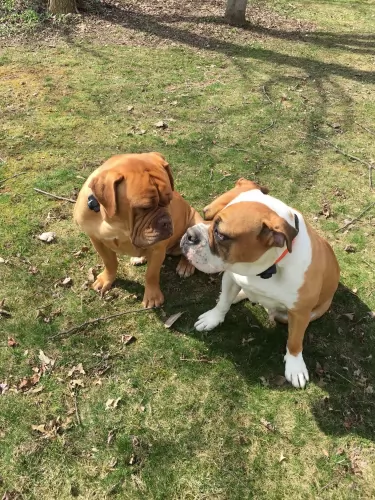 Petzlover
Petzlover Hermes Bulldogge is originated from United States but Tibetan Spaniel is originated from China. Hermes Bulldogge may grow 33 cm / 13 inches higher than Tibetan Spaniel. Hermes Bulldogge may weigh 61 kg / 135 pounds more than Tibetan Spaniel. Both Hermes Bulldogge and Tibetan Spaniel has same life span. Both Hermes Bulldogge and Tibetan Spaniel has almost same litter size. Hermes Bulldogge requires Low Maintenance. But Tibetan Spaniel requires Moderate Maintenance
Hermes Bulldogge is originated from United States but Tibetan Spaniel is originated from China. Hermes Bulldogge may grow 33 cm / 13 inches higher than Tibetan Spaniel. Hermes Bulldogge may weigh 61 kg / 135 pounds more than Tibetan Spaniel. Both Hermes Bulldogge and Tibetan Spaniel has same life span. Both Hermes Bulldogge and Tibetan Spaniel has almost same litter size. Hermes Bulldogge requires Low Maintenance. But Tibetan Spaniel requires Moderate Maintenance
 The Hermes Bulldogge is not a breed in itself, but is actually a line within the English Bulldogge line. The Hermes family in the United States bred this line for several years. The Hermes Bulldogge line is the largest of the re-creations from the English Bulldogge. They are inspired by the arena dogs from the days of the Roman Empire. Greg and Linda Hermes have bred healthy, smart, resilient and agile dogs. The desire of the Hermes was an attempt at recreating the 17th century dog.
The Hermes Bulldogge is not a breed in itself, but is actually a line within the English Bulldogge line. The Hermes family in the United States bred this line for several years. The Hermes Bulldogge line is the largest of the re-creations from the English Bulldogge. They are inspired by the arena dogs from the days of the Roman Empire. Greg and Linda Hermes have bred healthy, smart, resilient and agile dogs. The desire of the Hermes was an attempt at recreating the 17th century dog.
They used a variety of breeds to create the Hermes Bulldogge, most of whom are never disclosed. Some of the dogs that were probably used include: English Mastiffs, American Bulldogs, Old English Bulldogges, and pit Bull Terriers. This family of dogs are playful, friendly, and good family dogs. They have a strong prey drive which makes them good hunters but not as good around other small animals or small children. The Hermes have been breeding the Hermes Bulldogge since since 1983. The puppies are all hand raised, child friendly with great health.
When discussing the Hermes Bulldogge, one must go back to the root of the English Bulldogge. That breed comes originally from England and various lines have been recreated by various breeders. The breeding of the Old English Bulldogge with Mastiffs and Pits lead to other lines that the breeders called Old English. But most fanciers believe that only two lines of the original Old English Bulldogge remain and that is the Leavitt and the Hermes.
Some form of bulldog has been in existence since 700 years ago and as it was mixed with a variety of other breeds it took on other forms over time. The English Bulldogge was a definite couch potato. Instead of being bred for a job or look, the Bulldogge was developed with temperament, ability and health in mind. This has made for a great family dog without a lot of veterinarian bills.
 Known fondly as the Tibbie and being referred to as little lions’, the Tibetan Spaniel is an ancient dog breed.
Known fondly as the Tibbie and being referred to as little lions’, the Tibetan Spaniel is an ancient dog breed.
They appear in ancient art dating way back to 1100BC. This tells you that this small dog has been around for a jolly long time.
When you look at him, you can see that his predecessors were the Pekingese and the Lhaso Apso. It’s odd actually that he is called spaniel, as he doesn’t look like a spaniel at all and he has certainly never been a gun dog. He is more of a companion breed.
Even today, you’ll find these dogs living with monks in monasteries. The American Kennel Club recognized the breed in 1984.
 The Hermes Bulldogge, much like the original Olde English Bulldogge, is taller, healthier, more athletic than the original English Bulldog. They are medium height, with a large head, a strong body and a deep, wide chest and broad shoulders. Tails might or might not be docked but the ears are never docked. They n have a moderate amount of wrinkles and a longer, less smashed face than the original. It is easier for the Hermes Bulldogge to breath, to fly and to live in warmer environments that it is for the English Bulldogge. His eyes are lower in his head but in the front center.
The Hermes Bulldogge, much like the original Olde English Bulldogge, is taller, healthier, more athletic than the original English Bulldog. They are medium height, with a large head, a strong body and a deep, wide chest and broad shoulders. Tails might or might not be docked but the ears are never docked. They n have a moderate amount of wrinkles and a longer, less smashed face than the original. It is easier for the Hermes Bulldogge to breath, to fly and to live in warmer environments that it is for the English Bulldogge. His eyes are lower in his head but in the front center.
They are very dark almost black. Eyelids should cover the white of the eye and they have rounded cheeks. They have a short muzzle and short face. Broad, thick lips finish out the face with very large, square, broad jaws.
 Weighing between 4 to 7kg and standing at 23 to 30cm, the silky, double coat is fairly long and it sheds throughout the year.
Weighing between 4 to 7kg and standing at 23 to 30cm, the silky, double coat is fairly long and it sheds throughout the year.
The coat can be any color really, from tan to cream to brown and black and even a mix of colors.
The eyes are dark brown, the ears medium length and feathery and the tail is long and feathery too. The nose is fairly short and blunt.
The Tibetan spaniel is a small, active dog breed but not known to be shy or timid. He is an assertive dog, and intelligent too.
He would be better off having training and socialization as he is strong willed, stubborn and independent. He is loving, sweet and devoted to his owners.
He makes a good watchdog dog and will adapt well to life in the city or in the countryside. He can be both social and aloof, enjoying having his human family around him even though he may not be interacting with them.
He is playful and gets on well with children in the home as well as with other pets. He makes an excellent pet for older people too – he just needs to get his regular exercise.
 If socialized properly this line of bulldog is harmful to me.
If socialized properly this line of bulldog is harmful to me.
Strong and athletic, his strength and stamina.
He is not very adaptable. Apartments are not good for this dog. He needs to run and if possible to hunt.
He is very intelligent but stubborn which affects his learning ability.
 The Tibetan Spaniel dog is energetic and active, but doesn't require a lot of exercise. This makes him suitable for life in the city as well as the countryside.
The Tibetan Spaniel dog is energetic and active, but doesn't require a lot of exercise. This makes him suitable for life in the city as well as the countryside.
They’re social dogs and will relish any interaction with their human family. Give him the love and care he deserves and you’ll be rewarded with a loyal, loving friend.
 The Hermes Bulldogge is healthier than most bulldogs. His face is not as smashed and he is not as wrinkled. He can breathe easier than other Bulldogs. The two major concerns are hip dysplasia and bloat.
The Hermes Bulldogge is healthier than most bulldogs. His face is not as smashed and he is not as wrinkled. He can breathe easier than other Bulldogs. The two major concerns are hip dysplasia and bloat.
Hip Dysplasia also some elbow dysplasia: can cause lameness and arthritis
Terminal unless treated immediately. Can be prevented by not feeding large meals before or after heavy exercise.
 Tibetan Spaniels are generally healthy, especially if you provide them with good food and exercise.
Tibetan Spaniels are generally healthy, especially if you provide them with good food and exercise.
Whenever you’re looking to buy a puppy, make sure that you do research on where the puppy comes from. You don’t want to bring your puppy home and find that you’re faced with a host of health problems.
This eye problem effects photoreceptor cells which deteriorate over time and ultimately lead to blindness. It is an inherited disease that occurs in quite a few different breeds of dogs.
Dogs with this disease should never be bred. It isn’t a painful condition but you usually notice it when your dog has night blindness. Day blindness also occurs and later on cataracts can develop too.
 When feeding a Hermes Bulldogge puppy be sure you feed puppy meal for bulldogs or medium dogs. For first year fee 2-4 times a day 2 cups food.
When feeding a Hermes Bulldogge puppy be sure you feed puppy meal for bulldogs or medium dogs. For first year fee 2-4 times a day 2 cups food.
Feed the adult a solid adult dry food. 2 cups twice a day.
Better health than most lines of Bulldogs. Few wrinkles and less problems breathing as he doesn’t have a smashed face.
He doesn’t need a lot of exercise but daily walks and lots of play time. He can enjoy Lure Coursing obedience, agility and obedience
 The Tibetan Spaniel isn’t fixated on games and exercise like some other dog breeds are, but even so he isn’t a couch potato either. He will certainly require some moderate exercise such as a good walk every day.
The Tibetan Spaniel isn’t fixated on games and exercise like some other dog breeds are, but even so he isn’t a couch potato either. He will certainly require some moderate exercise such as a good walk every day.
You canine friend relies on you to make good food choices for him. Just like human beings have to watch what they eat if they want to remain healthy, dogs can’t just eat anything.
Feeding him an inferior diet will allow sickness. Commercially manufactured dog foods should be chosen with care, and there is a lot of information on the packaging to guide you.
Getting enough minerals and vitamins is imperative for good health. You should also try to give him some simplistic home-made food, while steering clear of toxic foods that could give your pet a whole lot of digestive problems. These are things like chocolates, crisps, peanuts, grapes, onions and spicy, exotic foods.
Just stick to simple, nutritious foods such as boiled chicken, brown rice and vegetables.
• Tibetan Spaniels will benefit from early socialization and training because then they become obedient and well mannered to have around with you wherever you go.
• Get your pet to the vet when he’s sick. As it is, he will need vaccines against serious pet illnesses as a puppy.
• Provide general grooming – a brush twice a week, checking inside the ears for redness, checking the eyes and checking for any unusual lumps.